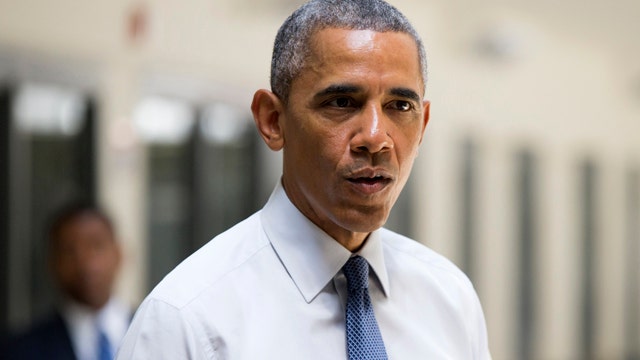President Obama visits correctional facility in Oklahoma
First visit by sitting president to a federal prison
From the White House to the big house, President Obama made an unprecedented presidential visit to a federal prison Thursday as part of his push for changes to the criminal justice system.
The president, after issuing dozens of commutations and tackling the subject during an NAACP address earlier this week, toured the El Reno Federal Correctional Institution, a medium-security prison for male offenders near Oklahoma City.
He met separately Thursday with law enforcement officials and nonviolent drug offenders doing time there.
In a brief statement to the media, Obama lamented the "huge surge" in incarceration since 1980, and said a primary driver of that is America's drug laws.
"We have to consider whether this is the smartest way for us to control crime," Obama said.
Obama has expressed hope that Congress will send him legislation to address the issue before he leaves office in 18 months, given the level of interest in the issue among Republican lawmakers and presidential candidates. Sen. Rand Paul, R-Ky., a 2016 presidential contender, is pushing to restore voting rights to nonviolent felons who have served their sentences.
According to the White House, Obama is the first sitting president to see the inside of a federal prison. Despite potential security concerns, Danny Spriggs, a former deputy director of the U.S. Secret Service, told the Associated Press the controlled environment of a prison is better than many public venues where presidents normally appear.
White House press secretary Josh Earnest said "unique steps" were being taken to protect Obama during the visit. He did not elaborate.
Meanwhile, the focus Thursday was on proposed changes to the criminal justice system.
From shortening the prison sentences of nearly four-dozen non-violent drug offenders to advocating the reduction, or outright elimination, of severe mandatory minimum sentences, Obama has argued forcefully this week for an alternative to the continued lengthy incarceration of people convicted of crimes he said did not fit the punishment.
Fourteen of the convicts whose sentences he commuted this week had been serving life in prison.
"If you're a low-level drug dealer, or you violate your parole, you owe some debt to society. You have to be held accountable and make amends," Obama said in a speech at the NAACP's annual convention this week. "But you don't owe 20 years. You don't owe a life sentence. That's disproportionate to the price that should be paid."
Obama wasn't the only one talking criminal justice reform Thursday. In New Jersey, GOP presidential candidate and Gov. Chris Christie called in a policy speech for giving nonviolent offenders with drug problems a better shot at rebuilding their lives. He pressed the need to treat drug addiction as a disease, calling for mandatory drug courts across the country, including in all 94 federal districts. Under a program he championed in New Jersey, nonviolent drug-addicted offenders can be sentenced to mandatory participation in drug treatment programs instead of jail time.
Obama has said taxpayers are the ones left to pay the $80 billion annual cost of locking up people who otherwise could be in rehabilitative programs for less than the cost of incarceration. Or they could be workers paying taxes, or be more involved in their children's lives, or be role models and leaders in their communities.
Overly harsh prison sentences, particularly for nonviolent drug crimes, are to blame for doubling the prison population in the past two decades, Obama said. Half a million people were behind bars in 1980, a figured that has since quadrupled to its current total of more than 2.2 million inmates.
The Associated Press contributed to this report.






















